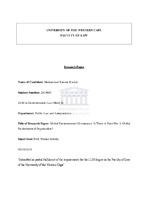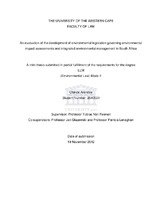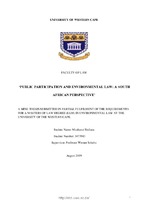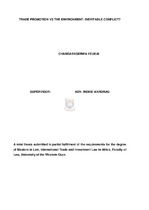Global environmental governance: is there a need for a global environmental organisation?
Abstract
In order to address the challenge of global environmental degradation and natural resource depletion, a complex and multi-layered environmental governance structure has materialised over the past few decades. There is widespread agreement that the current international environmental regime is too complex and inadequate to effectively address global environmental challenges. Thus, in order to control the threat of environmental degradation, many countries, authors, commentators and academics alike have opined that one centralised body be created for the effective control and governance of environmental matters on an international level. Governance is not the same as government. It includes the actions of the state and, in addition, encompasses actors such as communities, businesses, and Non-Governmental Organisations (hereafter referred to as NGOs). Within the context of the evolution of global environmental politics and policy, the end goal of global environmental governance is to improve the state of the environment and to eventually lead to the broader goal of sustainable development. The efficacy of global environmental governance will ultimately depend on implementation at global and domestic levels. National implementation is the ultimate key, both to the efficacy of the GEG system and to meaningful environmental improvements. In the following composition, I will critically analyse the concept of a Global Environmental Organisation (hereafter referred to as a GEO) and discuss whether the formation of such an establishment is indeed necessary to handle environmental matters on an international scale.
Related items
Showing items related by title, author, creator and subject.
-
An evaluation of the development of environmental legislation governing environmental impact assessments and integrated environmental management in South Africa
Arendse, Clarice (University of the Western Cape, 2012)This study provides an overview of the development of environmental assessment legislation in South Africa since the advent of democracy and critically assesses whether an effective regulatory system is in place. Where ... -
‘Public participation and environmental law: A South African perspective’
Sisilana, Mzubanzi (University of Western Cape, 2019)The Constitution of the Republic of South Africa ‘despite being one of the world’s most liberal constitutions, South Africans still have no transparent and participatory mechanisms for deciding democratically on the ... -
Trade promotion vs the environment: Inevitable conflict
Yeukai, Chandaengerwa (University of the Western Cape, 2005)This study unveiled the trade-environment debate which has been revolving in the World Trade Organization for quite a long time now. While economic integration and trade liberalization offer the promise of growth and ...




